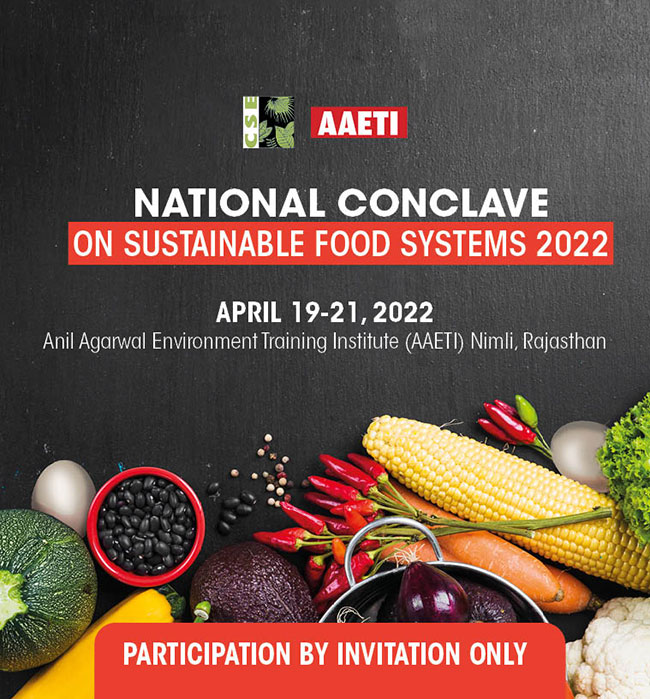“Sustainable food systems are critical for sustainable development. I congratulate CSE for organising this very important discussion,” said Rajiv Kumar, vice chairperson, NITI Aayog, while delivering the keynote address during the inaugural sessionon ‘Nutrition, nature and livelihood security in a climate-risked world’, at CSE’s National Conclave on Sustainable Food Systems 2022.
The three-day conclave began on April 19 at CSE’s Anil Agarwal Environment Training Institute (AAETI) in Nimli, Rajasthan.
“The way we produce our food impacts nature, nutrition and livelihood. In a climate-risked world, it becomes critical to get it right through a holistic food systems perspective and make it sustainable,” said Sunita Narain, director general, CSE, as she delivered the opening presentation.
“This means, we must focus equally and all together on nutrition, livelihood security and environment protection. This also means that we should minimise dependence on chemical-intensive food production practices,” added Narain.
CSE officially released its new report ‘Evidence (2004-20) on Holistic Benefits of Organic and Natural Farming’ during the inaugural session (you can download the report on the link given above).The report presents evidence collected and collated on aspects such as crop yield; cost of cultivation, income and livelihood; soil health and environment and food quality and nutrients.
Summarising the key findings of the report, Amit Khurana, programme director, sustainable food systems, CSE, said: “The evidence in our report makes it clear that organic and natural farming approaches are profitable and sustainable in comparison to chemical-based inorganic approaches, and productive over time. We should invest adequately towards making non-chemical farming a mass movement.”
“Growing evidence shows that non-chemical agriculture has several sustainable advantages. It is time to upscale it through a concerted action and we are working towards it,” said Rajiv Kumar while releasing the report.
Talking about the report, he added: “It is important that this work is disseminated far and wide — this report could be the tipping point in the future of natural farming. Carrying forward this publication could make the biggest difference in the promotion of agro-ecology, natural farming and climate-resilient farming.”
Kumar also highlighted the importance of logistics — transport, cold storage, warehouse and marketing facilities — for a natural farmer, and appreciated CSE’s efforts in including a separate session on better market access in the conclave.
The conclave is hosting about 70 experts from across the country, who will discuss several aspects of food systems ranging from evidence on benefits of organic and natural farming, role of organic and bio-inputs, market linkages and farmer producer organisations and transition to upscaling non-chemical agriculture.
The conclave would also involve deliberations on intensive food-animal systems in the context of antimicrobial resistance, zoonoses, climate change and biodiversity; and the need for warning labels on junk foods and importance of fortification and/or dietary diversification in addressing nutritional deficiencies.
“India needs to transform its food systems for future challenges — more so for the small and marginal farmers. We also need to focus on the interests of consumers. We need to grow our food in a nature-friendly way and cannot have a dystopian relationship with nature anymore,” said Narain while concluding the discussions on the inaugural session.



